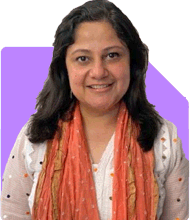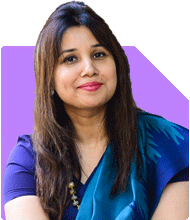Dr Aarti Bakshi | Answer |Ask -Follow
Child and Parenting Counsellor - Answered on Jun 23, 2023
A school counsellor, she has worked for 15 years with young adults.
She has two PhD degrees -- developmental psychology from Global Institute of Healthcare Management and clinical psychology from Singhania University.
She is on the CBSE panel for counsellors and special educators. She collaborates with SAAR Education to help children develop life skills.
She has authored SEL (social emotional learning) journals for Grades 1-8.... more

My son 7 years old has mild autism. He is good at Mathematics and reading words but cannot understand the meaning. Also his communication is very weak two or three words in sentences and logical communication is also not up to mark but his actions are logical and rational. Is there any chance of improvement in communication skills closer to a normal child.
Connecting with a special educator who can support you with activities and a way forward plan is a way too. Attend sessions with the spl educator to work on communication is needed.
You may like to see similar questions and answers below
Dr Deepa Suvarna |171 Answers |Ask -Follow
Paediatrician - Answered on Mar 06, 2023
Dr Aarti Bakshi | Answer |Ask -Follow
Child and Parenting Counsellor - Answered on Jun 23, 2023
Aruna Agarwal | Answer |Ask -Follow
Child and Parenting Counsellor - Answered on Aug 20, 2023
Ashwini Dasgupta | Answer |Ask -Follow
Personality Development Expert, Career Coach - Answered on Mar 22, 2024
Reetika Sharma |434 Answers |Ask -Follow
Financial Planner, MF and Insurance Expert - Answered on Dec 22, 2025
Ramalingam Kalirajan |10908 Answers |Ask -Follow
Mutual Funds, Financial Planning Expert - Answered on Dec 20, 2025
Ramalingam Kalirajan |10908 Answers |Ask -Follow
Mutual Funds, Financial Planning Expert - Answered on Dec 20, 2025
Naveenn Kummar |237 Answers |Ask -Follow
Financial Planner, MF, Insurance Expert - Answered on Dec 20, 2025
Ramalingam Kalirajan |10908 Answers |Ask -Follow
Mutual Funds, Financial Planning Expert - Answered on Dec 19, 2025
Nayagam P P |10859 Answers |Ask -Follow
Career Counsellor - Answered on Dec 19, 2025
Ramalingam Kalirajan |10908 Answers |Ask -Follow
Mutual Funds, Financial Planning Expert - Answered on Dec 19, 2025
Ramalingam Kalirajan |10908 Answers |Ask -Follow
Mutual Funds, Financial Planning Expert - Answered on Dec 19, 2025
Ramalingam Kalirajan |10908 Answers |Ask -Follow
Mutual Funds, Financial Planning Expert - Answered on Dec 19, 2025
Radheshyam Zanwar |6751 Answers |Ask -Follow
MHT-CET, IIT-JEE, NEET-UG Expert - Answered on Dec 19, 2025





























